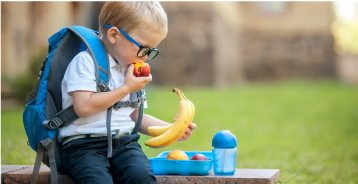Food for thought: The importance of nutrition for learning
 Family
Family
We need to process your personal information for you to interact with this website. We also use Cookies to enhance your experience. Please accept the Website Ts and Cs and Data Protection and Privacy Policy to fully access the website.
If you are supposedly what you eat, why are you not comforted by comfort food? This weird time in the world may be leaving you feeling rather anxious and what you eat can play a part in helping you to deal better and consequently feel better…or not. Here are a few simple diet tips that may help you to feel a little less on edge.
Protein may help to keep your blood sugar at a healthy level and help you to feel full for longer, so that you don’t crave sugar and unhealthy carbohydrates. Protein should also give you more energy for the day. Include low-fat yoghurt, eggs, cheese and peanut butter at your breakfast table. Even oats, and whole-wheat bread and muffins contain protein.
Foods rich in complex carbohydrates may increase your serotonin, a mood-boosting hormone. Include whole-grain breads and cereals, oatmeal and quinoa in your meal plan. Also include apples, bananas, berries, dark green leafy vegetables, beans, lentils, pumpkin, nuts and chia seeds.
Avoid processed and refined sugary foods and drinks. These contain simple carbohydrates, which are broken down quicker in your body to release energy, but will leave you feeling sluggish shortly after, which may affect your mood.
Eat fish, such as salmon or tuna, which are high in omega-3 fatty acids. You could also include flax and chia seeds, walnuts and canola oil in your diet. This may help your body to metabolise and use serotonin more efficiently, boosting your feelings of happiness and well-being.
Nutrients such as vitamins C and B6, magnesium, folic acid and zinc may also help your body to metabolise and use serotonin optimally. Fruit and veggies, whole grains, eggs, seeds, nuts, poultry, pork and fish contain some or all of these nutrients. In other words, a balanced diet may be key to overall feelings of well-being.
Your body is about 60% water. Dehydration doesn’t only negatively affect your energy levels and mental performance, but even mild dehydration from heat or exercise may affect your mood too. Make sure you drink about 2 litres of water every day.
To avoid dehydration, feeling on edge, as well as interference with sleep, avoid caffeine and alcohol as much as possible.
If you have a food sensitivity, you’ll know that it can cause unpleasant physical reactions that may lead to a change in mood, including anxiety. If you’re uncertain about whether you have a food sensitivity, consult your doctor. Make note of when you have food reactions, as well as the food additives in what you eat or drink.
Speak to your dietician
The best advice for overall wellbeing is to eat a healthy, balanced diet which includes lots of fresh fruit and veggies. For more dietary advice, Bestmed members 18 years and older, who complete their Health Risk Assessment (HRA), can make 3 free Personally Yours appointments with a network dietician as part of Bestmed’s Tempo wellness programme.
Speak to your doctor
Eating well is only one possible solution to reduce anxiety. Make sure you get enough sleep, exercise regularly and make sure you have the right emotional support. If anxiety begins to take its toll on your everyday life, speak to your doctor about the best possible treatments. Bestmed has a countrywide network of medical professionals that could help you. You can also visit the South African Depression and Anxiety Group’s website for assistance.